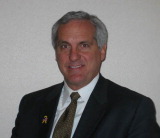United Methodist Women Back Border Senator's State Income Tax Plan
January 24, 2005
Shapleigh wins converts at lively legislative conference.
Written by Harvey Kronberg, Quorum Report

State Sen. Eliot Shapleigh (D-El Paso)
Around 150 members of the Texas United Methodist Women gave their enthusiastic support to a state income tax plan Monday after hearing a presentation by a top border lawmaker.
State Sen. Eliot Shapleigh (D-El Paso) gave his Invest in the Future, Invest in Our Kids power-point presentation to a lively and inquisitive crowd at the Capitol Auditorium.
Audience members shouted "the poor" when Shapleigh asked who paid the most in sales taxes in Texas. They shouted "no" when he asked if Texas' current tax system was fair or broadly based.
By the time the presentation was over Shapleigh had near unanimous support for a state income tax and a standing ovation. Members left the auditorium promising to take Shapleigh's message back to their communities.
"I come from a very poor part of Texas and this makes more sense than anything else I've heard," said Marcy Garza, a parent and educator from Pharr. "I think that we can pass this and when I get home I am going to push for it."
Ilda Vasquez, a Weslaco resident and president of the Southwest Texas Conference of United Methodist Women, said her organization had backed a state income tax in the past.
"I think that after seeing the senator's presentation, we can get even more support for the income tax. My people have got to hear about it," Vasquez said.
Under Shapleigh's plan, an education excellence fund would be created by a popular vote as set out in Article 24 of the Texas Constitution. It would include a five-percent flat tax, two-thirds of which would be dedicated to cutting property taxes. The remaining one-third would go to public education.
Shapleigh said that Texas voters would decide any increase in the fund. He said such a plan would produce $34.6 billion in extra revenue, with $23.1 billion going to reduce property taxes by 90 percent. The remaining $11.5 billion would go to public education.
Those earning less than $9,923 would pay $50 a month less in taxes. Anyone earning $25,533 would pay $46 a month less in taxes, while those earning $41,121 would pay $11 a month less in taxes.
Only those earning more than $62,000 would end up paying more in taxes under Shapleigh's plan. He calculates that 90 percent of border residents would be better off.
If the income tax was unpopular, Shapleigh said, states like Michigan and Ohio would not be first for attracting new businesses.
Shapleigh asked questions of the audience throughout the presentation. Many in the audience appeared clued up on Texas' current tax system. Many said they knew that the average Texas family pays more in sales taxes than property taxes. They also knew that, combined, the state's sales and property taxes make for a very regressive tax system.
Using information from the Comptroller's Office, Shapleigh pointed out just how regressive. A family earning less than $26,816 pays 11.1 percent of its income in state taxes. A family earning between $26,816 and $52,844 pays 5.5 percent of its income in state taxes. The percentage drops below four percent, however, for those earning more than $81,990.
"Not enough people are saying the truth about taxes," Shapleigh said, as he warned of a possible 23 percent national sales tax.
Members shouted "F" when Shapleigh asked what marks they would give for a state that ranks 49th in per capita spending on public services. "If you're cutting taxes, you're killing kids," Shapleigh said, referring to the recent scandals at Child Protective Services.
Some in the audience were surprised when Shapleigh pointed out that, in 2002-03, 66 percent of first grade enrollees at Dallas ISD were Hispanic. He cited State Demographer Steve Murdock's prediction that by 2030 household income would decline by $5,000 if Hispanic kids were not better educated. The audience applauded when Shapleigh said Texas should have got to work improving the state's education system five years ago.
Shapleigh was delighted at the response of the audience. "This is a tax and spend crowd. I don't know if we can have you back here," he joked.
![]()
![]()
Related Stories
![]()
Fair Use Notice
This site contains copyrighted material the use of which has not always been specifically authorized by the copyright owner. We are making such material available in our efforts to advance understanding of environmental, political, human rights, economic, democracy, scientific, and social justice issues, etc. We believe this constitutes a "fair use" of any such copyrighted material as provided for in section 107 of the US Copyright Law. In accordance with Title 17 U.S.C. Section 107, the material on this site is distributed without profit to those who have expressed a prior interest in receiving the included information for research and educational purposes. For more information go to: http://www.law.cornell.edu/uscode/17/107.shtml. If you wish to use copyrighted material from this site for purposes of your own that go beyond "fair use", you must obtain permission from the copyright owner.